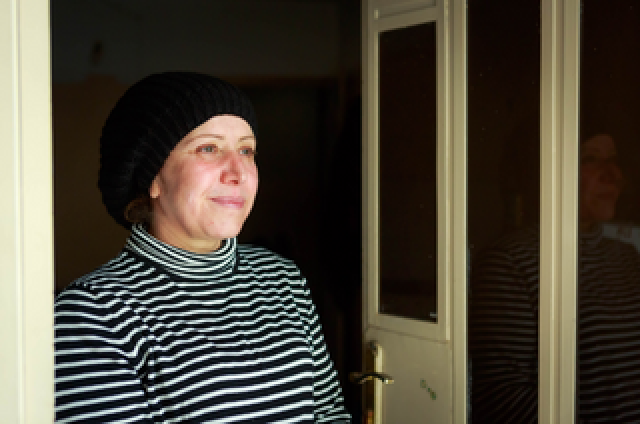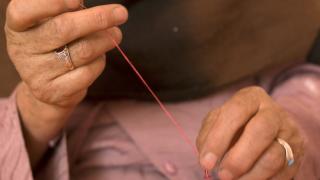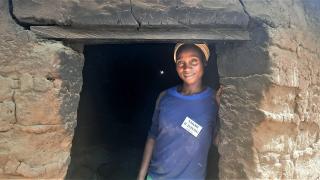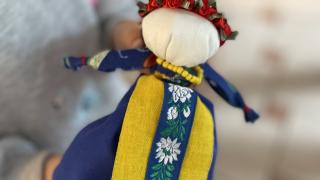Nastasiya
My name is Nastasiya
My name is not Nastasiya. It is too dangerous to tell you my real name. My husband is a soldier in the Armed Forces of Ukraine. Every day he is fighting for the survival of our country.
We have lost our home, our city and many of our neighbours, but we will not lose our spirit.
I am 35 years old and the mother of two children, a six-year-old daughter and a son who is ten. We used to live happily together on the Left Bank of Mariupol, a picture-perfect district of a city in eastern Ukraine. When the Russians began bombing Mariupol in the early weeks of the invasion, I had to stay alone with my children because my husband went to fight. I can’t begin to tell you how scary that was.
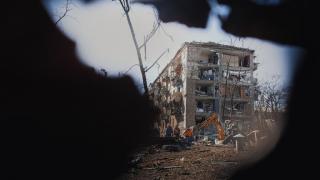
Two weeks later, you couldn’t even recognise Mariupol. Everything had turned to rubble. Without electricity or heat, people were dying from the cold. With no infrastructure left, people were melting snow for drinking water and some were looting stores because they were so hungry. Not knowing what else to do, we hid in our basement, suffering from lack of food and water.
After a month and a half, I had to make a big decision. It would be risky, but I felt if we didn’t leave right then, it might become impossible to survive.
So, we waited and waited, then one day, when the shelling temporarily stopped before dawn, we made a run for it. I took our documents and what little we could carry, having no idea what would befall us.
Quite frankly, some of the sections we passed through were especially dangerous; we literally had to run right under a hail of fire. I told my kids not to look up so they wouldn’t see all the shells flying by.
My plan was to get to Russia and from there to Finland and then back to western Ukraine. After walking 44 kilometers (some 27 miles) to Novoazovsk we faced a new challenge. We had to pass through “the filtration,” the term used for Russian checkpoints in occupied territories. There, everyone who wants to enter Russia is checked for their links to anyone in the armed forces. To save our lives, I threw away all my husband's documents and even forbade the kids to say that they had a father. I told the Russians that my husband was a scoundrel who had left his family many years before.
We were incredibly lucky. We went through all the filtration procedures and ended up in St. Petersburg. From there we went to Finland. Then, through the Baltic countries we managed to reach Dnipro in eastern Ukraine, but conditions there were not optimistic.
Finally, I had to make the decision to leave my homeland behind.
It defies imagination but we literally had to ride in a truck atop boxes of humanitarian aid. Afterwards, an NGO from Mariupol helped us evacuate to Poland, where we arrived in April 2022 with no place to stay and only the clothes on our back.
Thanks to Women for Women International and its partners, we were able to secure a temporary place of residence. But we were in a new country, new laws, new language. None of us could speak a word of Polish. It was overwhelming.
I am so grateful that I was able to resolve so many social and legal issues through the support of Human Doc. I learnt about the conditions of employment in Poland, how contracts differ, etc. I was even taught how to write a CV, which we never used in Ukraine. Afterwards, I began to feel more confident. A picture began to emerge in my head about how to proceed and organise our lives.
After everything we went through, I began to realise how much I wanted to help others who also knew the bitterness of war. Today I am proud to say I work for the UNDP (United Nations Development Programme), which supports people suffering from poverty and creates sustainable economic growth. Just knowing I have a job makes me smile, that I can support my children through such a tough time.
But what makes me even happier is that I am doing something really important for the Ukrainian people. One day I want to publish a book about what we’ve endured on the road to survival because I know it will help others.
We are still looking for long-term housing, a place that my children and I can call home – until we can be reunited with their father. In the meantime, it means everything to know that there are good people who are helping us, and that someone in the world cares about the terrible destruction we have had to live through.
Today, with your support, I feel I can handle everything.
Sifa
subtitle:
Motivated by the prospect of learning how to make clothes, Sifa joined the Stronger Women, Stronger Nations programme. But it was the lessons she learnt about women's empowerment that helped to transform her life.
Sarah
subtitle:
The Women for Women International programme was my ray of hope. It felt like I was finally completing my education which was cut short by poverty.
Olga
subtitle:
If someone had told me in the past that I would need to restart my life from scratch, I couldn't believe it. But that is what happened to me when I needed to flee to Poland with my son.

